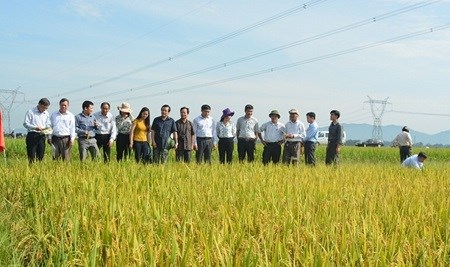
HCM City (VNA) – Vietnamese and Japanese researchers have completed an international project to develop a new rice variety that is disease- and insect-resistant with a high-yield, short-growth duration.
The project, called the "Development of Crop Genotypes for the Midlands and Mountain Areas of North Vietnam" was implemented from December 2010 to November this year.
Financed by the Japan International Cooperation Agency (JICA), the project was carried out by Vietnam National University of Agriculture (VNUA), Kyushu University and Nagoya University of Japan.
Dr. Pham Van Cuong, Vice President of VNUA, said: "Plant breeding in Vietnam has for years not been based on rigorous science. It has had a lack of scientific proof. But with the new technology transferred by Japan, we can make long-selling products with authentic proof based on science, and we can guarantee stable production and profit for producers."
The improved rice line has been well received because of its short-growth duration as it can help farmers avoid the flood season, minimise damages caused by annual typhoons and lead to more diverse cash crops during the winter crop season.
More than 50 promising rice lines, which have been genetically guaranteed to have good performances, have been developed.
The ecological adaptability of the selected lines was proven in Thai Nguyen and Lao Cai provinces. The rice varieties showed adaptability to not only the northern mountainous region but also to other environments in Vietnam.
The enthusiastic investment by the provincial government and Department of Agriculture and Rural Development of Nghe An (DARD Nghe An) has led to sustainable production of such improved lines and provided a prototype for other provinces in the country for development from promising rice lines from VNUA.
The technology, which can be applied to other crops such as soybeans, sorghum and maize as well as vegetables, helps to improve the quality of agricultural products.-VNA

 Previous page
Previous page Back to top
Back to top







